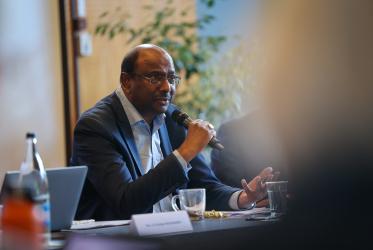“His Beatitude welcomed me warmly and expressed joy to meet again after many years. When he was a Metropolitan in Paris, HB visited a few times the Ecumenical Institute in Bossey and asked for scholarships to send students from Syria to be trained in and introduced to Ecumenical Studies. Two of the students he sent to Bossey are now holding important key positions in the Greek Orthodox Patriarchate of Antioch. One of them was recently installed as Metropolitan of Aleppo, which was vacant since 2013 when HE Paul Yazigi, the brother of the patriarch was abducted.”
The audience lasted much longer than planned and the discussions were both warm and intense. His Beatitude, as one of the WCC presidents, was interested to hear in detail about the WCC’s programmatic work, about the realities of the Ecumenical Movement today and about the steps taken towards the next WCC Assembly in Karlsruhe, Germany, next year.

WCC acting general secretary Rev. Prof. Dr Ioan Sauca (right) and WCC president, HB John X, primate of the Greek Orthodox Patriarchate of Antioch and All the East (left).
He conveyed thanks and appreciation to the WCC leadership and staff for the work done in these difficult times of pandemic, and expressed gratitude for the efforts undertaken to accompany and support Christians facing difficult situations and challenges in the world. He particularly mentioned appreciation that the WCC speaks today courageously to the challenges of our time with a renewed spirituality and a theologically rooted language and acts as a fellowship of churches and listens attentively to the voice of the churches it represents.
His Beatitude shared then with a visible pain about the tragic situation of the people and churches from his Patriarchate but also from the whole region of the Middle East due to war and conflict, continued by the ongoing social, political and economic crises. “Even if the conflicts seem to have calmed down, the situation of the people continues to be tragic,” said HB. “There is lack of everything in Lebanon: there is famine, electricity is given one hour per day in many areas, and in the pharmacies, even the most basic medicines cannot be found. The situation is desperate and the Churches do their best to be at the side of the suffering people and provide them with the basic needs.” Through the relief programmes organised by the Patriarchate, needy people from very poor areas are assisted, both Christians, Muslims and others. “There is not selection and priority when we try to help; all people are in the image of God and are our brothers and sisters who are waiting for our accompaniment and support,” His Beatitude said.
He expressed his will to come the Assembly in Karlsruhe. In the end, he thanked the WCC for having visited him and for its concern for the future of Christians in the region, expressed joy that for the first time an Orthodox is leading the WCC and particularly in these challenging times and entrusted the WCC fellowship to God’s care, protection and help.
Following the visit to His Beatitude, Sauca also visited the St John of Damascus Institute of Theology in Balamand, a prestigious school of orthodox theology in the Middle East, with students from many countries of the world but focused in particular to Arabic-speaking Christians. He was welcomed by the Dean of the institute, Archimandrite Prof. Jack Khalil, active member of the WCC Commission on Faith and Order and of the central committee of the WCC. Sauca had a meeting with the faculty and delivered a lecture followed by very lively discussions with the students on the ecumenical vocation of the Orthodox Church.

WCC acting general secretary Rev. Prof. Dr Ioan Sauca with students and faculty of the St John of Damascus Institute of Theology in Balamand.







